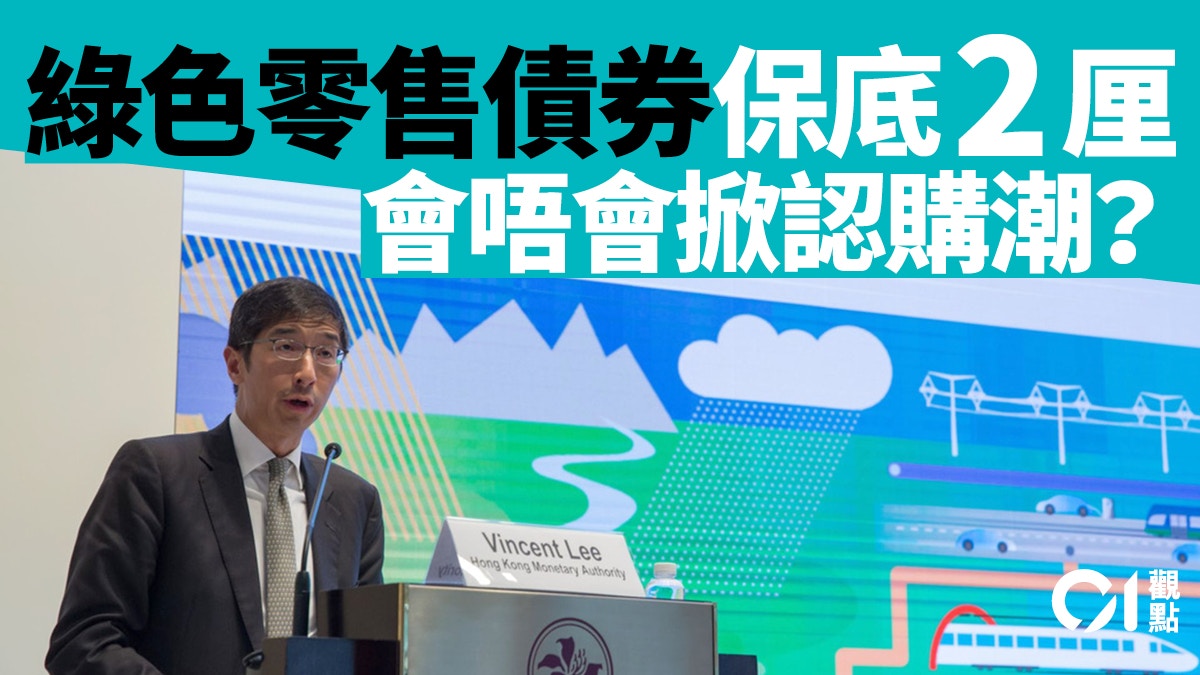This Tuesday (February 15), the Financial Secretary, Paul Chan, the Secretary for Financial Services and the Treasury, Xu Zhengyu, and the Deputy Secretary for the Environment, Mr. Tse Chin-wan, and other officials held a press conference to announce that they will issue green retail bonds for Hong Kong residents to subscribe next month. The issue amount is 6 billion Hong Kong dollars, and the semi-annual interest rate is linked to inflation and will not be lower than 2%.
This is the first retail bond to be launched under the government's green bond programme.
Unlike iBond, its funds will not be handed over to the Exchange Fund for management, but will be directly allocated to the Capital Works Reserve Fund to support green development projects that comply with the Green Bond Framework.
When Chen Maobo published his last "Financial Budget" in February last year, he stated that he would try to expand the types and issuance channels of green bond projects, and clearly proposed "plans to issue green retail bonds to allow citizens to participate."
However, the Hong Kong government waited until last November to finally issue US$3 billion worth of green bonds in US dollars and euros, and 5 billion yuan worth of offshore renminbi green bonds. Both rounds were institutional bonds rather than retail bonds.
At present, the global financial centers are also sparing no effort in promoting green bonds, and Hong Kong, which is at the forefront of development, is no exception.
The picture shows the launch of the Climate Bonds Initiative's "Hong Kong Green Bond Market Report" held by the HKMA in February 2019.
(Photo by Zhang Haowei)
There is still room for the implementation of the green bond quota
In the past, the SAR government issued bonds with the main purpose of promoting the local bond market, and often focused on institutional investor bonds.
However, in recent years, there are more and more opinions pointing out that official borrowing can make financial resources more abundant for infrastructure investment, and the return on bonds should also benefit more citizens.
From this point of view, the official decision to issue green retail bonds this time is in the right direction. At the same time, it will help to protect the fiscal treasury and promote the local bond market. Unfortunately, the government's decision-making pace is still prudent and slow.
For example, although all parties have fully anticipated that there is a high chance of over-subscription of retail green bonds this time, Xu Zhengyu still expressed the need to observe the market reaction at the press conference, and announced in advance that the total issuance amount will not be increased.
As of the end of last year, the total amount of green bonds issued under the government's green bond program was only about HK$56.663 billion, and bonds with a face value of HK$12.916 billion will also mature this year.
According to the resolution proposed by the Legislative Council under the Loan Ordinance in July last year, the maximum outstanding principal amount of the capital works reserve fund account borrowed and credited is HK$200 billion. It can be seen that the government still has a lot of room to expand retail green bonds. Debt borrowing needs to be restrained prematurely.
Monitoring project effectiveness should be strengthened
On the other hand, the authorities have repeatedly claimed that the issuance of green bonds is to "finance or refinance green projects with environmental benefits and promote sustainable development in Hong Kong", but their investment projects have been questioned in the past as having a limited role in this regard.
For example, Liu Zhifeng, director-general of the environmental group Green Earth, criticized Green Bond for supporting “O.PARK1” and “O.PARK2”, which deal with food waste. The recycling volume of the former is far from meeting the standard, and the latter is more likely to further reduce the two projects due to competition. overall performance.
O.
PARK1 has been in operation for two years, and the daily food waste recycling volume is only 110 metric tons, which is nearly half behind the target.
(Photo by Gong Jiasheng)
The reason why the issuance of retail green bonds this time was made to be announced on the eve of the release of the next budget, apart from the suspicion of "trailing behind" the previous budget, may also reflect the fact that officials still have some doubts about this decision. .
The main reason is estimated to be nothing more than fiscal risk.
But in fact, if the government wants to ensure the return on investment of green bonds, the best way to do it is to strengthen the supervision of the development efficiency of relevant green projects to ensure that they can really help promote renewable energy and improve the environment.
Government bond issuance is to invest in the future. Government bond issuance can increase the availability of public funds in the treasury. Hong Kong should seize the opportunity of the Chinese government bond market. The Hong Kong government should take advantage of the low interest rate environment to re-debt green bonds.
Part 1 | A new global trend: Hong Kong can become a green financial center








/cloudfront-eu-central-1.images.arcpublishing.com/prisa/2KVLLY26ZNGK3OCBRI676KYGKA.jpg)

/cloudfront-eu-central-1.images.arcpublishing.com/prisa/KMEYMJKESBAZBE4MRBAM4TGHIQ.jpg)



